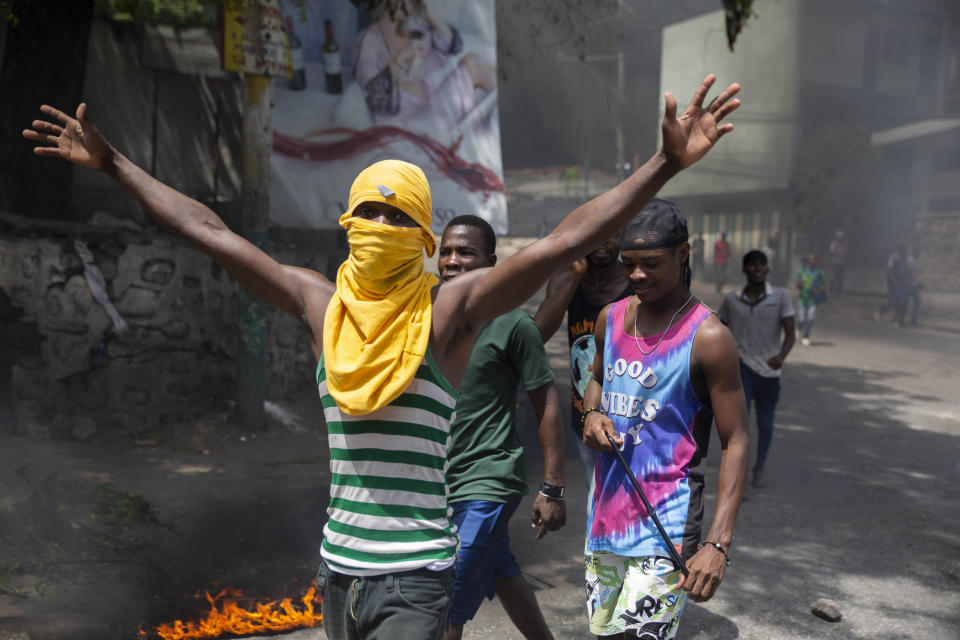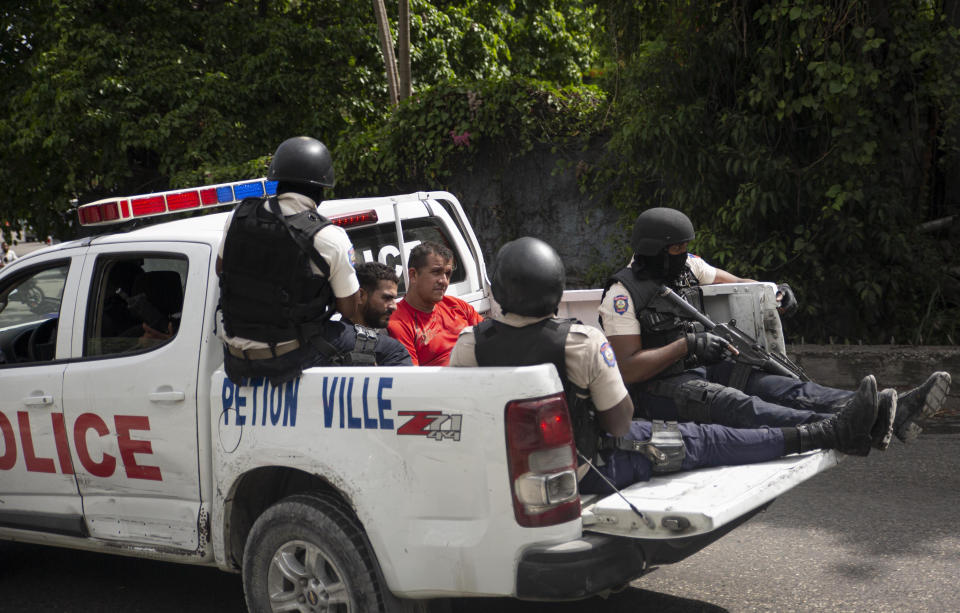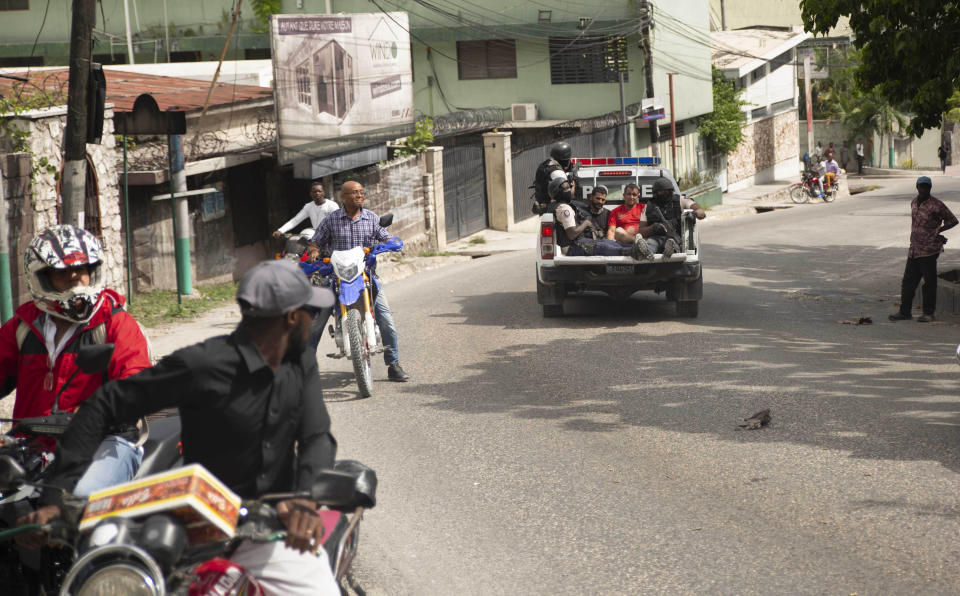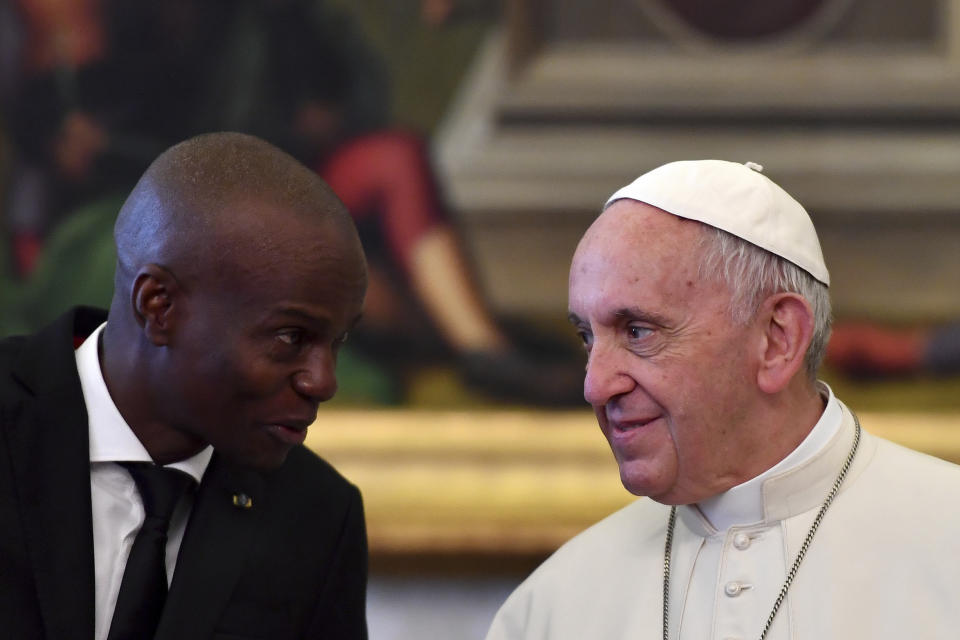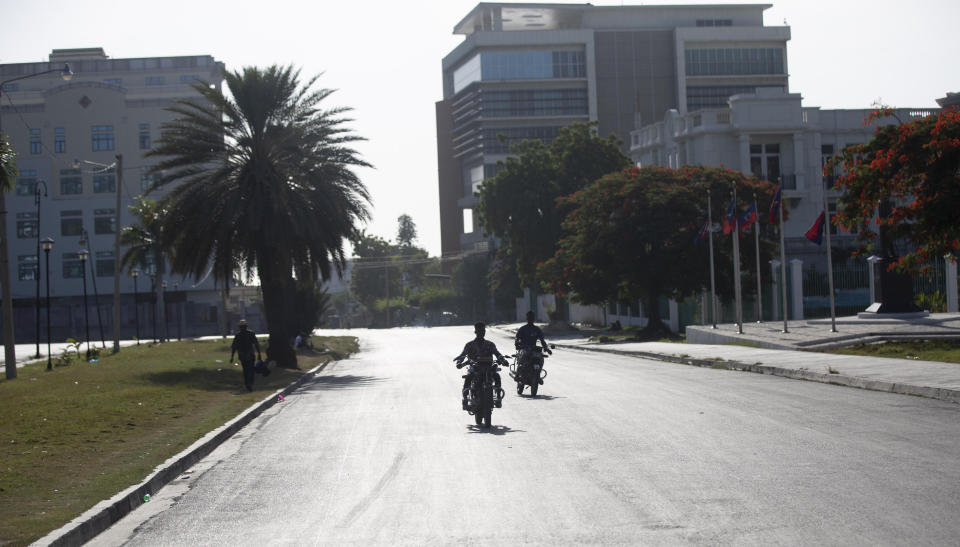The Latest: Dominican Republic urges world action on Haiti
- Oops!Something went wrong.Please try again later.
The latest developments in the assassination of Haitian President Jovenel Moïse:
UNITED NATIONS — The Dominican Republic, which shares the island of Hispaniola with Haiti, is urging the international community to put a high priority on dealing with the political crisis and insecurity in its neighbor.
The Dominican ambassador to the United Nations told reporters Thursday that the assassination of Haitian President Jovenel Moïse can only lead to further destabilization there.
Ambassador Jose Blanco says Haiti’s instability can no longer be ignored. He says Haiti should be subject to permanent monitoring, “not only for the region, but also for all of the international community.”
He criticized the U.N. Security Council for holding a private meeting on the Haiti crisis Wednesday and also for not inviting participation by the Dominican Republic, saying its own security “is directly impacted by this situation.”
___
PORT-AU-PRINCE, Haiti — Haiti’s elections minister says a U.S. citizen is among the suspects arrested in the assassination of President Jovenel Moïse.
Mathias Pierre told The Associated Press on Thursday that James Solages, a Haitian American, is among those arrested.
He did not give further information about Solages or about the nationality of the five others reportedly detained so far.
On a website for a charity Solages started in 2019, he describes himself as a “certified diplomatic agent,” an advocate for children and budding politician. The charity is meant to assist residents of the small coastal town of Jacmel in Haiti.
Solages also says he previously worked as “chief of bodyguards” at the Canadian Embassy in Haiti.
Calls to the foundation and Solages’ associates at the charity either did not go through or were not answered.
___
UNITED NATIONS — The U.N. special envoy for Haiti says the Haitian government has requested additional security assistance as well as help in investigating the assassination of President Jovenel Moïse.
Speaking from Haiti’s capital Thursday, Helen La Lime told U.N. correspondents that Haitian officials haven’t yet specified what kind of security assistance they want.
La Lime says that in the meantime, the United Nations needs to use the technical assistance that is part of its political mission in Haiti in a “more dynamic” way.
In her words, “we’ve got to be really working in the most effective way to ensure that this investigation moves forward and that the perpetrators of this horrible crime are brought to justice. That’s exactly what we intend to do.”
___
PORT-AU-PRINCE, Haiti — A Haitian judge involved in the investigation of the president’s assassination says that Jovenel Moïse was shot a dozen times and his office and bedroom were ransacked by the gang that attacked him, according to a Haitian newspaper.
The French-language Le Nouvelliste on Thursday quoted Judge Carl Henry Destin as saying investigators found 5.56 and 7.62 mm cartridges between the gatehouse and inside the house. It said Destin had been to the presidential residence as part of the investigation.
Moïse’s daughter, Jomarlie Jovenel Moïse, hid in her brother’s bedroom during the attack, he said, and a maid and another worker were tied up by the attackers who shouted “DEA operation” as they entered the property early Wednesday, the judge said, citing witnesses.
___
WASHINGTON — White House press secretary Jen Psaki says the U.S. believes Haiti should hold an election this year, regardless of concerns by some that the current situation in the country has made an election untenable.
“We called for an election this year, or we’re continuing to call for one, because we feel that supporting democratic institutions, the democratic process, is something that would be in the interest of the people of Haiti,” she told reporters at the White House on Thursday.
Psaki said that the White House had been in touch with the acting prime minister and “of course” the administration is “worried about, and closely monitoring, the security situation” in Haiti. And she reiterated the administration’s pledge to support the nation however needed.
“We stand ready to provide support, provide assistance, in any way that is formally requested by the government there. We are looking forward to hearing from them on what they would request and how we can help them through this period of time,” she said.
Meanwhile, the U.N.'s special envoy for Haiti, Helen La Lime, said in New York that interim Prime Minister Claude Joseph had told U.N. officials he plans to maintain the scheduled Sept. 26 election date. She said the U.N. is working with Haitian officials “to look at the issues and to do our utmost to meet this date.”
___
PORT-AU-PRINCE, Haiti — At least two suspects in the killing of Haitian President Jovenel Moïse were found and roughed up by civilians in the capital of Port-au-Prince and were then turned over to police.
Journalists saw scores of people gather around the men on Thursday, grabbing the suspects by their shirts and the back of their pants, pushing them and on occasion slapping them. People in the crowd said they had found the two hiding in bushes.
Police arrived shortly afterward to arrest the men, who were sweating heavily and were wearing clothes that seemed to be smeared with mud. Officers placed them in the back of a pickup truck and drove away as the crowd ran after them to the nearby police station.
Once the crowd arrived, some began to chant: “They killed the president! Give them to us. We’re going to burn them!”
The crowd later set fire to several abandoned cars riddled with bullet holes that they apparently believed belonged to the suspects. The cars didn’t have license plates and inside one of them was an empty box of bullets and some water.
National Police Director Léon Charles told Radio Métropole on Thursday that six people have been arrested, seven were killed and police are still looking for more of those responsible for the early Wednesday’s raid in which the president was shot to death and his wife, Martine, critically wounded.
___
PORT-AU-PRINCE, Haiti — Police say they have arrested four more suspects in the assassination of Haitian President Jovenel Moïse, bringing the total to six detained and seven killed.
National Police Director Léon Charles told Radio Metropole Thursday that police are still looking for more of those responsible for the early Wednesday’s raid in which the president was shot to death and his wife, Martine, critically wounded.
Officials haven’t given any details about the suspects, including their nationalities, nor did they suggest a motive for the attack, which they said was carried out by “a highly trained and heavily armed group,” whose members spoke Spanish or English.
___
ROME — Italy has strongly condemned the attack “on the heart of Haitian institutions" following the shooting death of Haitian President Jovenel Moïse.
The foreign ministry issued a statement on Thursday that also expressed hope that “those guilt of this crime be quickly brought to justice.” Italy appealed to “all actors and all the Haitian political forces so that they may preserve the delicate political equilibriums, prevent tensions and assure the institutional stability of the country and the security of the population.”
It urged the international community to support those efforts — even guaranteeing a constitutional referendum and elections.
___
DALLAS — Airlines canceled flights to Haiti for a second straight day on Thursday due to the closure of Haitian airports following the assassination of President Jovenel Moïse.
Under U.S. regulations, passengers are entitled to refunds. American Airlines, JetBlue Airways and Spirit Airlines waived costly fees for passengers who are booked on flights still scheduled over the next few days but who want to delay their plans until mid-July. The terms vary by airline.
Tracking service Flightaware said 28 flights, the vast majority of scheduled departures and arrivals at the main airport in Port-au-Prince, had been canceled by midday Thursday. The airport director had said Wednesday that only humanitarian and diplomatic flights would be allowed.
___
JIMANI, Dominican Republic — Dozens of trucks were backed up Thursday at the Dominican Republic’s border with Haiti, a crucial passage closed to most traffic following the assassination of Haiti’s president.
Journalists saw three trucks with Dominican license plates and two buses allowed through the Mal Paso crossing, but most were held back — frustrating hundreds of Haitians with baskets and carts on the other side who were waiting for the usual daily shipments of food and other cargo.
Dominican President Luís Abinader ordered the closure on Wednesday and also beefed up security along the border after Haiti’s government reported that a team of gunmen had assassinated Jovenel Moïse.
The president of the Dominican Association of Exporters, Elizabeth Mena, said she was worried that the closure could have serious repercussions for the Dominican economy.
___
ROME — Pope Francis has sent condolences to Haiti following what he said was the “heinous assassination” of President Jovenal Moïse.
Francis, who is recovering at a Rome hospital from intestinal surgery, condemned “all forms of violence as a means of resolving crises and conflicts,” according to a telegram signed by the Vatican secretary of state on Thursday.
The message said Francis was praying for the Haitian people and for Martine Moïse, the wife of the slain president who also was critically injured in the Wednesday attack at their home.
Prime Minister Claude Joseph assumed leadership of Haiti and decreed a two-week state of siege following Moïse’s killing, which stunned the Western Hemisphere's poorest nation.
Francis said in the telegram that he “wishes for the dear Haitian people a future of fraternal harmony, solidarity and prosperity.”
Moïse met with Francis in 2018 for talks on social problems afflicting the Caribbean nation, and in 2015, Francis convened a special conference on Haiti to mark the fifth anniversary of the devastating earthquake that killed more than 100,000 people.
